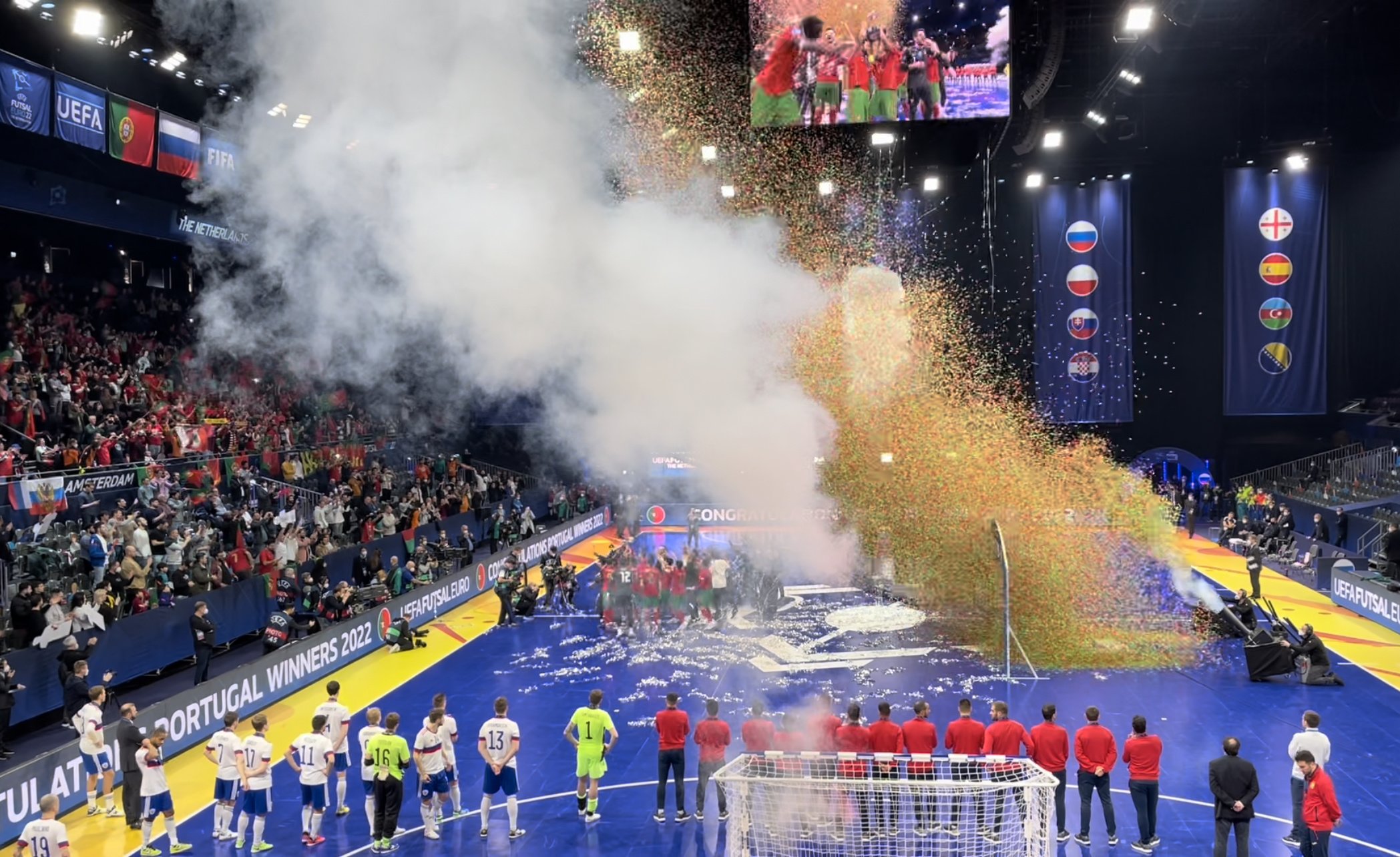Futsal world cup, Jorge braz: ‘Fifa could have the two biggest sports on the planet’
• World Cup 2024 Game-changers series:
1) The history-maker
JORGE BRAZ needs no introduction.
But this series of World Cup preview articles does.
The Game-changers series is a selection of interviews with coaches and players whose influence on the sport is unquestionable. Some, such as Portugal’s history-making, serial winning men’s futsal head coach, are busy preparing to compete in Uzbekistan in September. Others, while being fully paid-up futsal luminaries, may not be directly involved in the 10th Fifa futsal World Cup.
But every one of these “players” in this particular team of futsal game-changers are united by common traits: unbridled professionalism and driving passion to excel in and grow their chosen sport.
In candid interviews, they all reveal their love for the small ball and the 40x20 court – with reflections on their futsal formative years and inspirational figures. They also lift their heads up, scan the scene, and reflect on their own role and legacy in the game – on or off the court – while casting a spotlight on their hopes and expectations for the Uzbekistan 2024 tournament and wider perspectives on the future of the sport.
First up, then, is Jorge Braz, the unrivalled talent whisperer who led the seleção to historic World Cup glory in Lithuania in 2021 – a feat achieved in between winning and retaining the Uefa Euros in 2018 and 2022.
The victory in the first ever futsal Finallissima – inflicting yet more pain on arch-rivals Spain – made it an astonishing 35 tournament matches unbeaten for Portugal, who last tasted the agony of defeat back in Colombia 2016 when they lost out to Iran on penalties.
Now without the formidable presence of the one and only Ricardinho – famously described by Braz as a combination of Messi and Ronaldo in futsal – the serial-winning head coach is now busy building a new generation of Portuguese superstars visible in the form of Sporting CP’s powerful pivot Zicky Té and the dazzling Benfica winger Lúcio Rocha.
But Braz took time out from preparing for the big kick-off in Uzbekistan to open up to futsalstreetspot.com on his hopes and aspirations for Portugal and the wider game of futsal.
As the headline above suggests, the Canada-born former goalkeeper is forthright about the need for clear strategic intent and governance to elevate futsal to a stage befitting of the sport.
In the candid interview below, Braz – whose thoughts after winning the 2021 World Cup also feature prominently in Futsal: The Indoor Game Revolutionizing World Soccer – sheds light on:
His formative years and university education in futsal
How serious injury led to coaching
The sweet spot of maturity and ‘irreverence of kids’ that fuels Portugal’s success
Learning to live without Ricardinho on court
How futsal should be thinking bigger than simple law changes
The JORGE BRAZ Story
My first experience of futsal – and how I got hooked
I wasn’t picky. I played whenever there were games at university, whether it was 11-a-side or 5-a-side. And then I started playing futsal in the university championships. That year we won the University of Porto’s championship and went to the final of the national university championship, where we lost to UBI, from Covilhã, a team that was coached by Zé Luís, my current assistant.
Before long, I was called up to the futsal national team, by Orlando Duarte, and participated in the first university world championship. The following year I went to the 2nd edition of that world cup.
I was still in a team from Porto, Joarte, but in the meantime I finished the university course and went to Chaves to teach and play in the Pontauto team, in the 1st futsal division. The following year I went to Braga, to the University of Minho. But this is where fate took hold. I suffered a serious injury – a broken leg – and stopped playing.
Next I became a coach and spent five years in the University of Minho team. This was followed by UTAD and Fundação Jorge Antunes. I enjoyed three fantastic years in a professional team.
Portugal’s Ascent
The journey to the top of the mountain as double Euros, World Cup 2021 and inaugural Finallissima winners
I want to be clear: this was the result of hard work, of several years building our process in which we were able to consolidate and qualify the work.
This is the most important point.
Then, after so many experiences and many final tournaments in which we failed in decisive moments, that was also a big learning process.
We had to understand what we were missing.
This, combined with all these young people who were appearing in this qualification work process, was good to understand what we had to cling to. In that thin line where success or failure in a competition is defined, we are lucky enough that it has fallen to our side.
It was about everyone’s competitive maturity. But there’s a contradiction here too. Because yes there’s this competitive maturity but it’s combined with this irreverence of kids who are arriving better prepared at the senior age. This is all built over many years, but it also has to do with this maturity and experience for passing that phase.
My biggest achievement?
I feel proud in everything, in the entire structure, the entire FPF family, the staff we have, is all tremendous. And then, of course, in the players, in all the Portuguese players.
Each country has its advantages and disadvantages.
Fundamentally, I am extremely proud of the way the team believes in our futsal and in what we have to play, enjoying and with “joy in our legs”. Above the titles and achievements we have had, what makes me most proud is the way each player has an exemplary behaviour in all circumstances: on the field, from a social point of view, in what is the interaction with colleagues, respect for others.
That's what makes me proudest. The titles are a bit of a reflection of this.
Motivation to stay at the top? ‘We always have to want more’
Something that sport teaches us clearly is that the most important day is the day of the next training session. Whoever has this mentality can be in the national team.
Those who don't have it, can’t.
We have a huge responsibility to Portuguese futsal, to Portugal and to the federation. The day of the next training session is the most important day and we always have to want more.
But this, for me, is easy because, fortunately, what I have felt is that this is very intrinsic and natural in all of them. This group and the players who have been here have a great desire. Just look at this qualification process in which we are inserted.
Everyone always wants something more.
Coping without O Mágico in the first World Cup without him since Chinese Taipei in 2004
Ricardinho is a great reference in Portuguese and world futsal. Throughout his career, he was an example of what it is to train and compete at the limits, achieve goals and win things.
But it’s important to know that he’s is our ambassador and is always present among us, inspiring us with team incentives and visits.
“The laws of the game, the possible changes, is something very important. But we have to reflect on all, not just a few”
The future game
My view on talk of potential law changes on the pitch or rule/governance changes off the pitch to help futsal
Above all, there should be a strategic development plan. What is the government pla for futsal? What is the vision? Where are we going? What kind of implementation do we want for the women’s futsal? These are the fundamental questions.
The laws of the game, the possible changes, are something very important. But we have to reflect on all, not just a few. What can help the game to be more attractive? That is the big question. It seems to me that everyone is discussing small details, which will do little to help global development.
Fifa could have the two biggest sports on the planet. They already have it in football, they could also have it in futsal.
How to be an example to countries such as England, where futsal is underdeveloped
We have already shared everything with England.
Our vision, the steps we have taken, and we have even shared moments of operationalisation of the national teams.
A country like England would be important to appear strongly in futsal. For a country that likes football so much, the ball at its feet, properly developed, could be very interesting indeed.
“I say that whoever comes to futsal, usually stays”
Finally, how do I define the unique attractiveness of futsal?
It’s the uncertainty and how quickly you can change the score. In addition to the supremely high-quality technical and tactical actions.
I say that whoever comes to futsal, usually stays.
Next in the Game-changers series: 2) The legacy-builder: Pierre Jacky, France
Have something to share? Add your comment below.














MIGUEL RODRIGO is ready for his last dance with Thailand. The globe-trotting Spanish tactician reveals his futsal inspirations plus hopes and predictions for the World Cup in Uzbekistan